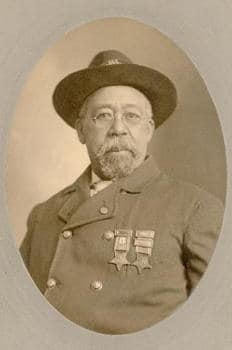William B. Gould’s meticulous entries in his diary about daily life in the United States Navy from September 27, 1862, to his discharge three years later, gives critical insight and serves as one of the only known diaries of an African American sailor in the Civil War.
Gould, an enslaved, who escaped to become a civil war veteran had six sons enlisted in the service. Five of them fought in World War I and another in the Spanish-American War.
Gould (1837 – May 25, 1923) was born to a slave woman and perhaps an Englishman. He learned to read and write and was known for his detailed entries in a diary about his work as a plasterer. He was enslaved by the Nixon family and worked on the Bellamy House.
On September 21, 1862, Gould (WBG) escaped with seven others by rowing a small boat 28 nautical miles (52 km) down the Cape Fear River and out into the Atlantic Ocean where the USS Cambridge of the Union blockade picked them up as contraband.
After his escape, Gould joined the U.S. Navy and believed he was “defending the holiest of all causes, Liberty and Union.” Beginning with his time on the Cambridge and continuing through his discharge at the end of the war he kept a diary of his day-to-day activities.
Gould’s Civil War diary chronicles described his service and life as a sailor on the U.S.S. Cambridge and later on the U.S.S. Niagara, which took him from the northeastern U.S. to Great Britain, Holland, Belgium, Spain, and Portugal.
The diary is distinguished not only by its details and eloquent tone, but also by its author’s reflections on the conduct of the war, his own military engagements, race, race relations in the Navy, and what African Americans might expect after the war and during the Reconstruction Era. There are only two significant hiatuses, one for the period May-October 1863, when he is hospitalized with the measles, and the other for the late September 1864-early February 1865 period, which appears to be a section that was somehow lost.

After he was discharged from the Navy at the Charlestown Navy Yard in Massachusetts, he married Cornelia Read in November 1865. Cornelia was a former slave who was then living on Nantucket and they corresponded throughout the war. The Goulds moved to Milton Street in Dedham, Massachusetts, and together they had two daughters and six sons. In Dedham, Gould “became a building contractor and community pillar.”
He died on or about May 25, 1923, at the age of 85 and was interred at Brookdale Cemetery in Dedham. The Dedham Transcript reported his death under the headline “East Dedham Mourns Faithful Soldier and Always Loyal Citizen: Death Came Very Suddenly to William B. Gould, Veteran of the Civil War.”
His great-grandson, William B. Gould IV, served as chair of the National Labor Relations Board from 1994 to 1998 and edited his great-grandfather’s diary into a book titled Diary of a Contraband: The Civil War Passage of a Black Sailor.










